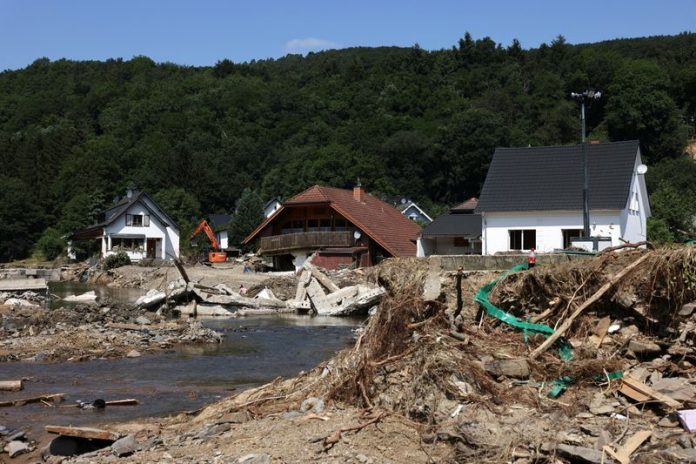
(Fixes typo in headline)
INSUL, Germany (Reuters) – When Lara Tillmann rushed to help her family in the picturesque German town of Insul a day after it was devastated by floods, she found dazed survivors emerging from their homes “like ghosts”.
“The roads were all gone, the cars were all gone, you had to walk prodding a stick in front of you so you didn’t fall through,” she told Reuters TV on Wednesday.
Insul, a 750-year-old village in the rural Eifel region of western Germany famous for its hiking trails and rolling hills, was among the worst-hit in the floods, the country’s most deadly natural disaster in more than half a century.
“The people were like ghosts coming out of their houses just trying to see whether their neighbours were still alive, are the old people still there, who is still alive, who is well and ok,” said Tillmann, who lives in Cologne, about 65 kilometres (40 miles) from Insul.
More than 170 people died in the floods in Germany, including 123 in the Ahrweiler district of which Insul is a part.
Nearly a week later, the German military has set up temporary bridges across the Ahr river that runs though the centre of the village.
The medieval bridge that had previously spanned the river collapsed in the flood, cutting off residents on one side – including Tillmann’s parents, aunts, uncles and grandparents – from road access and relief crews.
“In the first days nobody could get to us. No fire brigade, no THW (relief crews), nobody,” Tillmann said. “The first days were really bad.”
The German government on Wednesday announced plans to provide up to 200 million euros in emergency aid to repair buildings and local infrastructure and to help people in crisis situations.
But rebuilding is expected to take many months. A major focus of emergency crews has been providing survivors with clean water, food and shelter while power and water lines are repaired and rubble is cleared.
“I think better times can only start again when it is possible to start rebuilding rather than ripping things down,” Tillmann said.
(Writing by Maria Sheahan; Editing by Giles Elgood)























